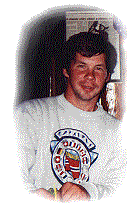Louis Spray had the amazing good fortune and skill to catch three world-record muskies during the first half of the 20th Century even though not all of the records were acknowledged in his lifetime. It took the dogged investigatory prowess and commitment of John Dettloff to prove his case and disprove the claims of others.
Now Dettloff, a guide, writer, historian and operator of Indian Trail Resort in Hayward, Wis., has combined his years-long research with information from an autobiography Spray wrote before his death in 1984, into a book called "Three Record Muskies in His Day: The Life and Times of Louie Spray".
 Dettloff,
42, originally from Chicago, displayed old photo-graphs and copies of yellowed
newspaper stories about Spray and other catches at his booth last weekend at
the three-day Chicago Muskie Show at Harper College in Palatine.
Dettloff,
42, originally from Chicago, displayed old photo-graphs and copies of yellowed
newspaper stories about Spray and other catches at his booth last weekend at
the three-day Chicago Muskie Show at Harper College in Palatine.
Even more dramatically, Dettioff brought along the original mount of the 67½ pound, 60¼ inch-long muskie caught by Cal Johnson in 1949. Usually on display in its glass case at the Moccasin Bar in Hayward, Dettioff gained special permission to travel with the mount, provided he guarded the gargantuan fish closely. That meant he had to take the fish home to his hotel for safe keeping each night.
"I'm the bodyguard." Dettloff said. "We have pallbearers. As we parade it out of the show, there's kind of a respectful silence."
There is no better audience than a gathering of passionate muskie fishermen to view the awesome fish, or for that matter, read Dettloff's somewhat astonishing tale. The history of world record muskie catches is a checkered one, complete with cheats and frauds, outlandish claims and almost to-good-to-be-true tales.
Somehow, it is not surprising that even now different fishing authorities recognize different world records. The International Game Fish Association in Dania Beach, Fla., recognizes Johnson's catch as the genuine world record. The National Fresh Water Fishing Hall of Fame recognizes Spray's largest catch, a 69 pound, 11 ounce monster, also caught in 1949, as its record. The disparity stems from the fact Spray shot his fish before landing it, a legal practice in Wisconsin until 1966. The IGA does not recognize records boated in this manner.
"That was the way of doing business up here," Hall of Fame executive director Ted Dzialo said. "We all carried guns for shooting muskie.
Spray was born in 1900 and lived most of his 84 years in northern Wisconsin towns, where he made all of his big catches. Spray was a colorful, roguish character who at times was a lumberjack, bootlegger, baseball manager, Studebaker salesman and cafe, casino and bar operator, who occasionally had run-ins with the law.
When Dettloff began investigating the lineage of the muskie record, he expected to prove that Spray's stunning claim of three world records was fishy, if not fraudulent. Instead, as his research intensified, and Dettioff studied claims by New York, Michigan and Canadian muskie men, he showed that skeptics were wrong.
"There always has been [doubt] to some degree," Dettloff said. "As it turns out, his fish are the best documented. I've never found any evidence [Spray's claims] weren't true. I found misinformation, myth and jealousy."
Spray's first world record was a 59½ -pound muskie caught in 1939. His second world record was a 61-pound, 13 ounce muskie caught in 1940. When Spray caught his 69-11 fish, it eclipsed Johnson's catch. However, others' claims were recognized instead and only much later disproved. It took until 1995 for Spray's final record to be recognized.
"At this point we feel Spray's fish is a solid record," Dzialo said.
To some, it seems absurd that any one man could catch three world records. What are the odds? Funny thing, Dettloff studied that angle.
"On the surface, it might seem highly improbable," Dettloff said. "But the law of proability statistics say that the odds are the same for each catch. Spray did fish the best waters, I do think he was fishing in the glory years.
Spray's fish were viewed widely even paraded around nearby communities by tall-tale-telling friends. Dettioff the theorizes Spray's extracurricular activities, combined with his pals' lies and Spray's comments to throw others off the scent of his favorite fishing holes, contributed to future doubts about his veracity.
However, there were witnesses to Spray's catches, hundreds of others who saw the freshly caught fish, photographs and even a 1950 appearance at the Chicago International Sports and Outdoor Show when Johnson's and Spray's largest fish were shown.
What did not help Spray's credibility later in life, and after his death, was an unfortunate 1959 fire that destroyed all of his mounts. Yet Dettloff's meticulous examination, decades after the fact, turned up living witnesses, written accounts and enough first-hand observations to back up Spray's claims.
"We have it straightened out," Dettloff said.
Spray was apparently a rascal, but the greatest muskie fisherman of all.